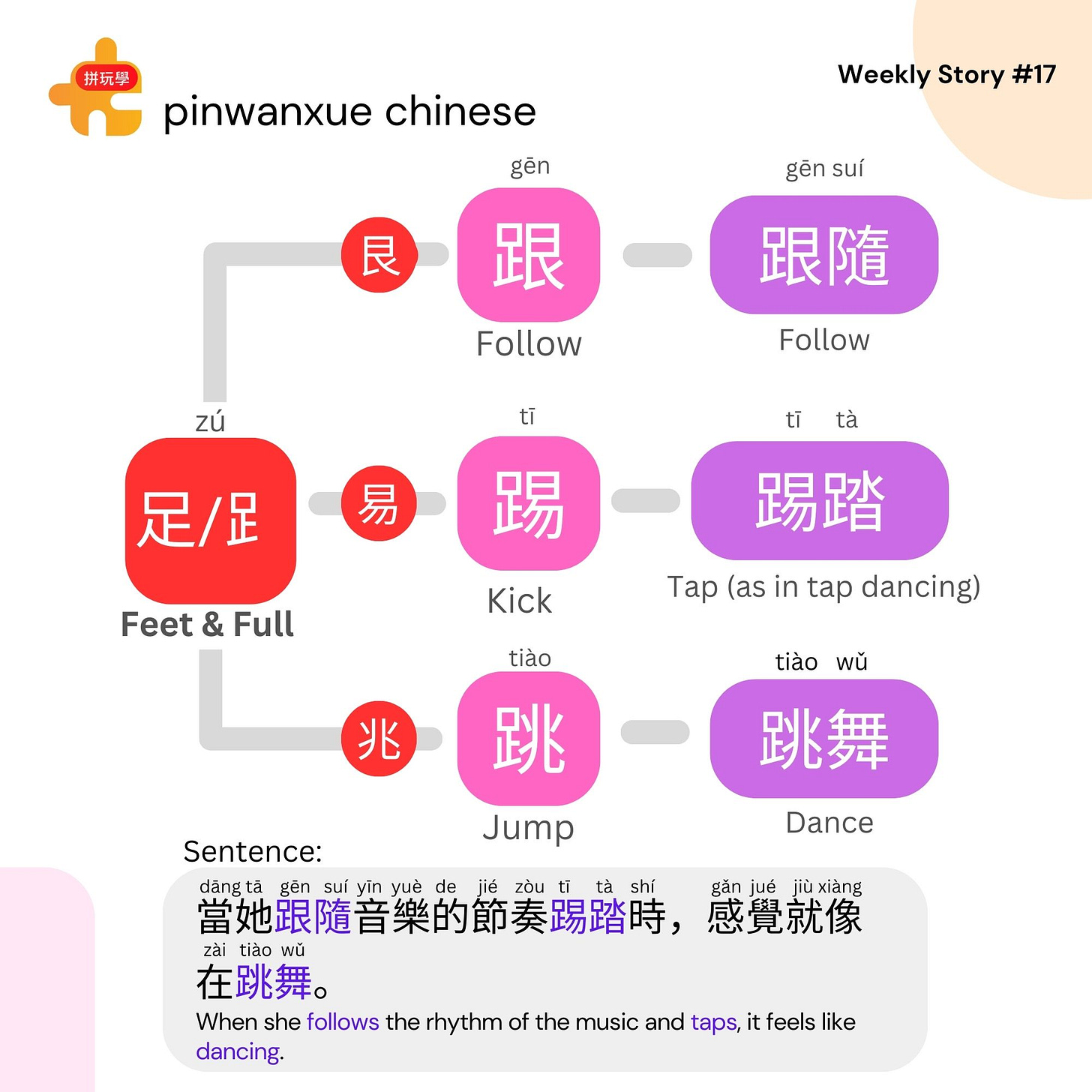Hey there! Let's talk about the radical 足/⻊! The radical 足/⻊ means "foot"and “leg”. In some cases, like in the word 滿足 (mǎnzú), it also carries the meaning of "full" or "satisfied." The radical 足/⻊ is mostly found in Chinese characters related to actions involving the feet or movement. We’ll use the examples of 跟 (跟隨), 踢 (踢踏), and 跳 (跳舞) to explore the connections!
Firstly, we’ll learn about 跟 (跟隨)! The character 跟 (gēn) means "to follow" or "to accompany." If you break it down, you can see the radical 足/⻊ on the left side! The radical 足 in 跟 highlights the concept of movement, and it represents the idea of "footsteps" or "following through walking." When someone follows another person, their feet are in both in motion, so this creates a link or connection between them.
Then, we have the character and phrase 踢 (踢踏): the character 踢 (tī) means "to kick." The radical underlines the emphasis on the feet's action.
Last but not least, we have 跳 (跳舞), which means "to jump" or "to leap"! With the radical 足/⻊ on the left side, the character signifies an action involving the feet. So, in this case, the radical 足 might highlight the involvement of the feet and legs in the act of jumping.
In these examples, we can see how the radical 足/⻊ contributes to the overall meaning and connotation of the characters by emphasizing the foot-related actions and movement. So, make sure you recognize the 足 radical in characters related to foot-related actions! It’s a handy one to know.
Chinese Radical 足/⻊ : Story
Audio:
小紅是個活潑可愛的小女孩,她住在農場裡。農場舉辦了大型的舞會,小紅興奮極了,心想:「我要去跳舞了」。舞會當天,她穿上漂亮的洋裝,當她跟隨音樂的節奏踢踏時,感覺就像在跳舞。在舞池裡,小紅認識了很多朋友,大家一起跳舞,玩得開心極了。舞會結束後,小紅開心地說:「跟隨音樂跳踢踏舞,真好玩!」。從此,小紅就愛上了跳舞,每當有音樂,她都忍不住跳起踢踏舞來。大家笑著說,小女孩是農場最會跳舞的人!
English
Xiao Hong is a lively and adorable little girl who lives on a farm. The farm organized a large dance party, and Xiao Hong was extremely excited, thinking to herself, "I'm going to dance!" On the day of the dance, she put on a beautiful dress. As she followed the rhythm of the music and tapped, it felt like she was dancing. In the dance hall, Xiao Hong made many friends, and they all danced together, having an incredibly fun time. After the dance party, Xiao Hong happily said, "Following the music and dancing tap dance is so much fun!" From then on, Xiao Hong fell in love with dancing. Whenever there's music, she can't help but start tap dancing. Everyone smiles and says that the little girl is the best dancer on the farm!
Example Sentences
gēn suí
跟隨 - follow
tā xǐhuān gēnsuí tā de péngyǒu qù tànxiǎn
她喜歡跟隨她的朋友去探險。- She enjoys following her friends on adventures.
tī tà
踢踏 - tap dance
zài zhōumò wǎnshàng, wǒmen huì qù tiào tī tà wǔ
在週末晚上,我們會去跳踢踏舞。 - On weekend evenings, we go tap dancing.
tiào wǔ
跳舞 - dance
tā xǐhuān tiào wǔ, tèbié shì lading wǔ
她喜歡跳舞,特別是拉丁舞。- She loves dancing, especially Latin dances.
tiào tī tà wǔ
跳踢踏舞 - tap dance
xiǎo hóng zhèngzài xué tiào tī tà wǔ, tā jìnbù de hěn kuài
小紅正在學跳踢踏舞,她進步得很快。- Xiao Hong is learning tap dancing, and she's progressing quickly.
gēn suí yīn yuè
跟隨音樂 - follow the music
zài pàiduì shàng, dàjiā gēnsuí yīnyuè yīqǐ tiào wǔ
在派對上,大家跟隨音樂一起跳舞。-At the party, everyone dances together, following the music.
Hope you're enjoying my short story! For more tips on Chinese, subscribe to me. 😊 It’s free, and a paid subscription is optional. Thanks!
Keywords
huó pō kě ài
活潑可愛 - lively and cute
nóng chǎng
農場 - farm
dà xíng
大型 - large-scale
wǔ huì
舞會- dance party
xīng fèn
興奮 - excited
jié zòu
節奏 - rhythm
wǔ chí
舞池 - dance floor
wán de kāi xīn
玩得開心 - have fun
jié shù
結束- end, finish
zhēn hǎo wán
真好玩 - really fun
ài shàng
愛上 - fall in love with
rěn bù zhù
忍不住 - can't help but





